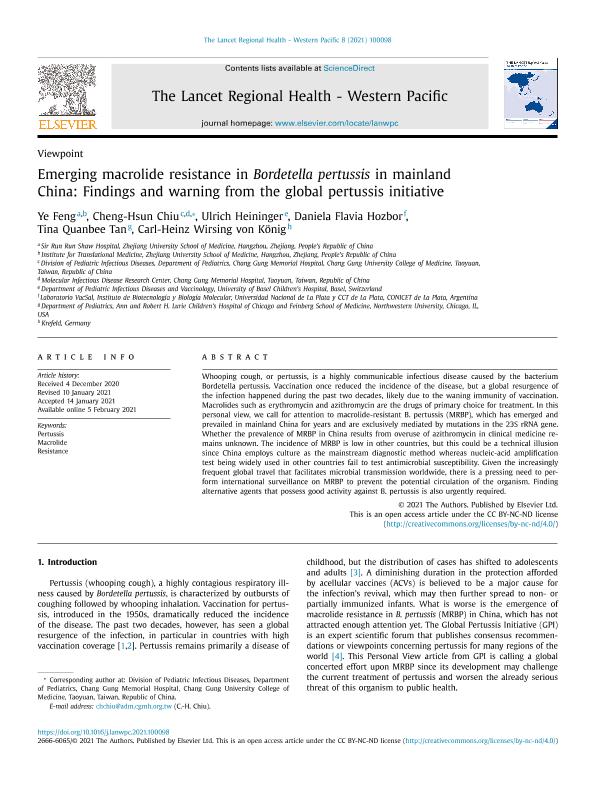Mostrar el registro sencillo del ítem
dc.contributor.author
Feng, Ye
dc.contributor.author
Chiu, Cheng Hsun
dc.contributor.author
Heininger, Ulrich
dc.contributor.author
Hozbor, Daniela Flavia

dc.contributor.author
Tan, Tina Quanbee
dc.contributor.author
von König, Carl Heinz Wirsing
dc.date.available
2022-12-13T16:10:48Z
dc.date.issued
2021-03
dc.identifier.citation
Feng, Ye; Chiu, Cheng Hsun; Heininger, Ulrich; Hozbor, Daniela Flavia; Tan, Tina Quanbee; et al.; Emerging macrolide resistance in Bordetella pertussis in mainland China: findings and warning from the global pertussis initiative; Elsevier; The Lancet Regional Health - Western Pacific; 8; 3-2021; 1-4
dc.identifier.issn
2666-6065
dc.identifier.uri
http://hdl.handle.net/11336/180997
dc.description.abstract
Whooping cough, or pertussis, is a highly communicable infectious disease caused by the bacterium Bordetella pertussis. Vaccination once reduced the incidence of the disease, but a global resurgence of the infection happened during the past two decades, likely due to the waning immunity of vaccination. Macrolides such as erythromycin and azithromycin are the drugs of primary choice for treatment. In this personal view, we call for attention to macrolide-resistant B. pertussis (MRBP), which has emerged and prevailed in mainland China for years and are exclusively mediated by mutations in the 23S rRNA gene. Whether the prevalence of MRBP in China results from overuse of azithromycin in clinical medicine remains unknown. The incidence of MRBP is low in other countries, but this could be a technical illusion since China employs culture as the mainstream diagnostic method whereas nucleic-acid amplification test being widely used in other countries fail to test antimicrobial susceptibility. Given the increasingly frequent global travel that facilitates microbial transmission worldwide, there is a pressing need to perform international surveillance on MRBP to prevent the potential circulation of the organism. Finding alternative agents that possess good activity against B. pertussis is also urgently required.
dc.format
application/pdf
dc.language.iso
eng
dc.publisher
Elsevier

dc.rights
info:eu-repo/semantics/openAccess
dc.rights.uri
https://creativecommons.org/licenses/by-nc-nd/2.5/ar/
dc.subject
MACROLIDE
dc.subject
PERTUSSIS
dc.subject
RESISTANCE
dc.subject.classification
Biología Celular, Microbiología

dc.subject.classification
Ciencias Biológicas

dc.subject.classification
CIENCIAS NATURALES Y EXACTAS

dc.title
Emerging macrolide resistance in Bordetella pertussis in mainland China: findings and warning from the global pertussis initiative
dc.type
info:eu-repo/semantics/article
dc.type
info:ar-repo/semantics/artículo
dc.type
info:eu-repo/semantics/publishedVersion
dc.date.updated
2022-09-20T12:40:20Z
dc.journal.volume
8
dc.journal.pagination
1-4
dc.journal.pais
Países Bajos

dc.journal.ciudad
Amsterdam
dc.description.fil
Fil: Feng, Ye. Zhejiang University School of Medicine; China
dc.description.fil
Fil: Chiu, Cheng Hsun. Chang Gung University College of Medicine; China. Chang Gung Memorial Hospital; China
dc.description.fil
Fil: Heininger, Ulrich. Universidad de Basilea; Suiza
dc.description.fil
Fil: Hozbor, Daniela Flavia. Consejo Nacional de Investigaciones Científicas y Técnicas. Centro Científico Tecnológico Conicet - La Plata. Instituto de Biotecnología y Biología Molecular. Universidad Nacional de La Plata. Facultad de Ciencias Exactas. Instituto de Biotecnología y Biología Molecular; Argentina
dc.description.fil
Fil: Tan, Tina Quanbee. Northwestern University; Estados Unidos
dc.description.fil
Fil: von König, Carl Heinz Wirsing. Krefeld; Alemania
dc.journal.title
The Lancet Regional Health - Western Pacific
dc.relation.alternativeid
info:eu-repo/semantics/altIdentifier/url/https://linkinghub.elsevier.com/retrieve/pii/S2666606521000079
dc.relation.alternativeid
info:eu-repo/semantics/altIdentifier/doi/http://dx.doi.org/10.1016/j.lanwpc.2021.100098
Archivos asociados
